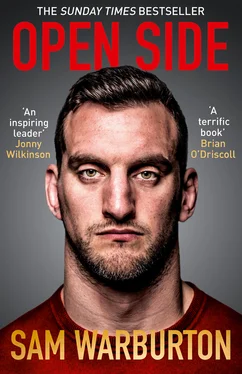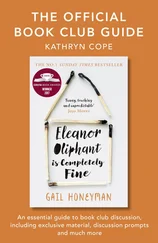‘First play after you’ve come on. You’ve got the ball. Short pass off 9. Now, don’t think of it from your point of view. Think of it from the point of view of the Irish player waiting to tackle you. What’s he seeing? He’s seeing how big you are, how strong, how dynamic. He’s seeing all your explosive power, and how much you love the confrontation, and he knows that when you smash into him it’s going to hurt and it’s going to take him backwards, and bang! There it is, and you’re through him and there are a couple of your boys piling in behind and you’ve got front-foot ball and the Irish are scrambling and your backs love you for setting them up like this.
‘OK. Rewind back to the moment you get the ball. Now imagine it from the ref’s point of view. Imagine where he’s standing, looking at you from side-on. He’s seeing the determination on your face, and all that power in you as you run, and he’s thinking “I’d better have my eyes peeled here, because this boy’s going to be hard to put down” – and bang! You’re through the first tackle – which means he’ll be giving Wales good ball, which means Ireland will try to slow it down at the ruck, which means they’re going to risk getting pinged for infringing at the breakdown.
‘OK. Rewind again to the pass off 9. Now imagine yourself in the crowd, high in the stands. What have you come to watch? The hits. Think of the ancient Romans and the gladiators. It’s alpha males, it’s one-on-one dominance. It’s in our DNA. The crowd see your power and intent, and they’re bracing themselves for something they can feel 25 rows back – and bang! They shudder at the impact, and then they’re looking at each other and grinning, like “How about that!”’
We do this for four separate incidents – a carry, a lineout, a tackle and a jackal. For each incident Andy makes me think of it from the same three viewpoints: the opposition player, the ref and the crowd. By the time we’ve done all 12, I’m feeling so confident that I could run out at Croke Park here and now. I see it all unfolding almost in slow motion, as though my brain and body are so much quicker than everybody else’s.
I open my eyes.
‘How long do you reckon we’ve been in here?’ he asks.
‘Ten minutes?’
‘Thirty-five.’
Andy helps me in other ways too. He teaches me relaxation techniques, tensing and relaxing various parts of my body until they feel heavy. He’ll massage my head and neck until I’m practically asleep. And he works with me to produce a document that we call Warby’s Winning Ways .
It’s ten pages or so, and I keep it as a PDF on my phone. It’s there so that I can continue to reinforce my positive mindset and remind myself that I’m good enough to be playing international rugby, that I deserve to be playing international rugby and that I add value to every team I play for.
On the front is a picture of me walking out of the tunnel at the Millennium before a Wales match. Behind me the tunnel is lit up all red, and on my face is an expression of total focus: confident in my ability, completely ready for the battle ahead.
Inside are some of my statistics on the pitch and in the gym: I’m strong, I’m fit, no one’s going to better me physically. There are positive newspaper clippings from people in the game I respect praising me. There are photographs of me playing well, and of people who matter to me: my parents, my brother and sister, Rach, Mr Morris and Lennox Lewis, whom I idolised as a kid. My dogs Ted and Gus too, of course; wouldn’t be properly Warby without my dogs.
We’ve even included pictures and logos of the companies that sponsor me, such as Land Rover, adidas and PAS supplements, because these companies wouldn’t be endorsing me if they didn’t believe in me both on and off the pitch.
Later in my career, when I’m more confident as a player, a person and a captain, I won’t need all this. But right now the third of those isn’t yet an issue, and the first two still need a lot of work. So I keep Warby’s Winning Ways close by at all times, and it’s invaluable.
Saturday, 20 March. My first Six Nations start, against Italy at the Millennium. My opposite number is Mauro Bergamasco. He’s smaller than me, but he’s a very good player with that bit of devil in him that all top opensides need. Un cane sciolto , as he once described himself: a marauding dog, an outlaw. He’s played on the wing and at scrum-half for them too. Definitely not your average 7.
‘If you don’t get the first shot in on him,’ Martyn tells me before the match, ‘he’ll niggle you all game.’
I don’t need telling twice.
Five minutes in, I see Mauro contesting a ruck. I come flying in like an Exocet and clear him right out. He, the ref, the crowd – they all see and feel that, just like Andy told me they would.
Mauro doesn’t come back at me all game.
Of all the things I work on and am known for, the breakdown is the single most important aspect. It’s a much bigger part of the game than it used to be; there are something like 170 breakdowns every game, which is almost double the number at the 1995 World Cup, which marked the end of the amateur era, and almost six times the number back in the early 1970s. There are also four and a half times as many breakdowns per game nowadays than scrums and lineouts combined.
That’s helped a new species of defender evolve: the jackal, who pounces on the ball when it’s taken into contact by the opposition and tries to scavenge it. The ultimate aim is of course the turnover, when you rip the ball from the opposition player and secure it for your own side. An interception try apart, the turnover is the single biggest momentum shifter in rugby. Suddenly, the team that were attacking not only have the wind knocked out of them by the frustration of losing the ball, but they also have to instantly reorganise into a defensive structure before the counterattack comes – and, statistically, that moment of transition leads to a disproportionate number of scoring opportunities. A player who can reliably secure four or five turnovers a game is worth his weight in gold.
In every team I play for, I am that player.
The jackal is the one who comes in after the tackler to try and grab the ball from the man on the floor. If you’re exceptionally quick you can be both tackler and jackal, bouncing up off the floor to go from one to the other, as long as you release the opponent after the tackle and before the attempted jackal. But at international level things happen so fast that this isn’t usually an option. Better to hunt in pairs, as I do with Lyds; he goes low to bring the man down and I’m on that man in a flash. Lyds and me: tackle and jackal.
The jackal’s not allowed to support his own bodyweight, which means no knee resting on the opposition player or hands on the ground beyond the ball. This means I have to be both very flexible and very strong; very flexible to get into the low, wide stance I need to secure the ball, and very strong to withstand the hits coming in from the other opposition players arriving at the ruck. Sometimes you get smacked by two or three men at a single ruck. It hurts. Trust me.
So for 15 minutes before and after every training session, I work exclusively on hip mobility: working my glutes, my groin and my hamstrings. I take the heaviest kettlebell I can find, set myself in a sumo squat and go from left to right and back again, shifting my weight all the way over onto one foot and then back through the centre to the other. Deep and strong, I tell myself. Deep and strong.
It’s basic physics. The lower you can go, the harder you are to shift. As Vince Lombardi, the legendary American football coach, used to tell his blockers, ‘The low man wins.’ If you’re low enough over the ball, the opposition players won’t be able to get beneath you to drive you up and out of the way. That’s where the leverage comes in, and without that they’re trying to shift you backwards without first weakening your strong position.
Читать дальше












